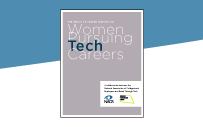
NACE surveyed early career professionals about their experiences and attitudes; in this article, we examine the effects of gender on the experiences of early career talent.

Although allyship with the LGBTQ+ community different for everyone, one thing is clear: It requires action.

Despite the Supreme Court’s 2023 ruling overturning affirmative action, the decision appears to be having little to no impact on employers’ DEI recruiting priorities.

Winner of NACE’s 2024 Diversity, Equity, and Inclusion Excellence Award for colleges, the Georgia Tech Career Center’s Georgia Tech’s AuthenTECH Partnership initiative leverages staff to provide population-specific resources, expand programming, and cultivate partnerships to advance equitable career outcomes.

Belonging at work—feeling that one is valued, accepted, and supported—helps to ensure a healthy, productive, and positive work environment. NACE surveyed its membership to better understand their experiences with belonging in the profession.

Recent data reveal that systemic barriers continue to limit progress on achieving pay equity for all—yet there are tangible, proven ways that career centers and employers can make an impact.

Consultant Katie Donovan offers tips for employers to eliminate the main causes of pay inequity for women, including that women are underpaid doing the same jobs as men and are underrepresented in leadership roles.

When it comes to the attributes of a job and an organization and the benefits the organization offers, there are some differences in student preferences by race and gender.

Women remain underrepresented in computer science majors and careers. Two researchers conducted a study to see how women in computing experience and make sense of their internships, and how their internship experiences shape their future career plans.

A study found that mentorship, community, biculturalism, and resilience are crucial resources and skills that Black women can use to advance their careers.

Recent studies reveal that systemic barriers continue to limit progress on achieving pay equity for all, but there are tangible, proven ways that career centers and employers can make an impact.

As HBCUs are a key source of high-quality, diverse talent for employers, there are benefits for both institutions and organizations in developing successful partnerships.

A joint research project by the National Association of Colleges and Employers (NACE) and Break Through Tech uncovered the positive impact career services has on outcomes for women in general and for women pursuing tech careers in particular. The research is detailed in “The Impact of Career Services on Women Pursuing Tech Careers,” which is free to the public.

To foster a truly diverse and inclusive workplace, employers should expand their DEI efforts to encompass what is increasingly being referred to as DEIA—or diversity, equity, inclusion, and accessibility.

Evangeline “Eva” Kubu, Princeton University, explores how to address long-standing systems and practices to ensure all Ph.D. students have equitable access to comprehensive professional development.

This study, a collaboration between NACE and Break Through Tech, provides evidence that career services can help level the playing field for women pursuing STEM careers.

As October is National Disability Employment Awareness Month, several organization offer resources about disability inclusion for employers and career services offices to use now and throughout the year.

Due to their underrepresentation in the classroom and societal messaging around technology being a “masculine domain,” women in computer science often feel isolated and marginalized. A study demonstrates how women’s experiences in computing internships shape their future career decisions; the findings have implications for both career development professionals and employers who recruit entry-level talent.

Early data from a forthcoming NACE study indicate that the gender pay gap has widened over the past year, with female graduates now earning just 72 cents to every dollar earned by male graduates, down from around 81 cents.

Data provided by more than 2,300 bachelor’s degree-level graduating seniors who took part in NACE’s 2023 Student Survey demonstrate that systemic inequities continue to exist in internships—not only in terms of who takes part, but also in terms of who gets paid.